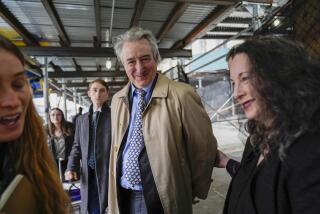Some Charges Against Columbia S&L;’s Spiegel Dropped
After “a hard look at the evidence,” federal prosecutors dropped one set of criminal charges against Thomas Spiegel, the former Columbia Savings & Loan chief now on trial in Los Angeles for allegedly looting the failed Beverly Hills thrift.
Although the dropped charges formed only part of the government’s case, they were among the most serious because they involved the largest amount of money lost.
Dismissed Thursday were nine felony counts related to testimony by Santa Barbara auto dealer Howard Schneider, the central witness in what prosecutors said was a scheme by Spiegel to use improper loans from Columbia to get access to luxury cars and a 50% stake in Schneider’s Gregg Motors.
Gregg Motors eventually failed, and prosecutors said Columbia lost more than $10 million on the loans. The government had alleged that Spiegel put through the loans even though he knew that the financial information Schneider filed to obtain them was false.
Spiegel’s defense team has continually tried to impeach Schneider’s credibility.
John F. Walsh, the chief prosecutor, would not say specifically why the charges were dropped.
“We took a hard look at the evidence, and based on all the evidence, including impeachment evidence, we just felt we shouldn’t go forward with that portion,” Walsh said Friday.
Walsh also declined to comment on the relative importance of the Gregg Motors charges, but the dismissal was seen as an embarrassing setback for prosecutors since they had plea bargained with Schneider to obtain his testimony in the first place.
Schneider pleaded guilty to two felony fraud counts involving the misapplication of Columbia funds and the filing of false financial statements.
Spiegel’s lawyers have contended from the outset that Schneider was “a liar” and “a con man” who testified against Spiegel only to gain a lighter sentence for himself.
Brad D. Brian, one of Spiegel’s lead defense attorneys, declined to comment Friday on the dismissal of the charges.
The Gregg Motors charges were the basis for one of four primary sets of allegations that form the case against Spiegel. He still faces 37 felony counts alleging that he improperly benefited from some Columbia business deals, that he caused Columbia to purchase and lavishly furnish a $1-million Palm Springs condominium for his own use, and that he had the thrift pay tens of thousands of dollars for his personal collection of firearms.
Columbia, one of the top buyers of junk bonds issued through former Drexel Burnham Lambert finance wizard Michael Milken, was seized by federal regulators in 1991 at an estimated cost to taxpayers of $1.2 billion.






